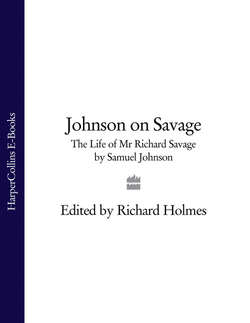Читать книгу Johnson on Savage: The Life of Mr Richard Savage by Samuel Johnson - Samuel Johnson - Страница 10
6
ОглавлениеUp to this point in the biography, Johnson appears largely in the role of Savage’s advocate, skillfully pleading his case, plangently emphasising his misfortunes, and thunderously attacking his enemies. It is a brilliant rhetorical performance. The reader is wonderfully gripped and impressed, even if not entirely convinced. But from the moment Savage is pardoned in 1728, and his fashionable ‘golden’ period of social success and patronage begins, a subtle change starts to steal over Johnson’s narrative. (p-32)
Melodrama shifts to satire, increasingly at Savage’s expense. A note of black comedy creeps in, and Savage’s outrageous behaviour towards Lord Tyrconnel points towards something incorrigeable and profoundly damaged in his nature. He luxuriates in the wealthy patronage, but also exploits it shamelessly and thoughtlessly. He causes chaos in Lord Tyrconnel’s apartments; he orders about his servants; he brings cronies back to the house late at night, and drinks his cellars dry of their best wines. Having given him a collection of valuable books, stamped with his own arms, [Tyrconnel] had the mortification to see them, in a short time, exposed to sale upon the stalls, it being usual with Mr Savage, when he wanted a small sum, to take his books to the pawnbroker, (p.41)
As Savage repeatedly fails to take control of his life, there is a new note of philosophical reflection. Imperceptibly, advocacy gives way to moral enquiry. Savage’s character, rather than his brazen claims, gradually becomes Johnson’s central concern, and he sees him embarked on a never-ending Dantesque treadmill of self-deception. ‘He proceeded throughout his life to tread the same steps on the same circle; always applauding his past conduct, or at least forgetting it to amuse himself with phantoms of happiness, which were dancing before him; and willingly turned his eyes from the light of reason, when it would have discovered the illusion, and shown him, what he never wished to see, his real state.’ (p.52)
The episodes of the Volunteer Laureateship, the publication of the obscene poem The Progress of a Divine’, and the disastrous quarrel with Tyrconnel mark a steadily downward trajectory. Now black comedy is shifting towards a more human and universal tragedy. Johnson himself seems to move closer to the narrative surface. We become increasingly aware, if only subliminally, of Johnson as the shrewd eyewitness. He is the sympathetic companion, but the also undeceived judge of character Observing Savage’s mixture of professional pride and childlike vanity as a poet, he recalls with a painful smile. ‘He could not easily leave off, once he had begun to mention himself and his works; nor ever read his verses without stealing his eyes from the page, to discover in the faces of his audience, how they were effected by any favourite passage.’ (p.103) Such a remark could only have been made by someone who had spent, and perhaps endured, many hours in Savage’s company.
Johnson’s presence as the anonymous observer, or unnamed ‘friend’ increases throughout the penultimate part of the biography that covers Savage’s return, in the winter of 1737–8, to the lonely and humiliating poverty of Grub Street (p.70).
Many incidents begin to reflect Johnson’s own experiences at Lichfield and Oxford, such as the shameful time well-meaning friends left him a pair of boots at his college door when he was a poverty-stricken undergraduate. Savage’s friends also humiliated him with good intentions. Savage ’came to the lodgings of a friend [clearly Johnson] with the most violent agonies of rage; and, being asked what it could be that gave him such disturbance, he replied, with the utmost vehemence of indignation, ‘that they had sent for a tailor to measure him.’ (p.83)
Savage’s love of conversation, his hunger for company, and terror of loneliness are also, hauntingly, those of the isolated and depressive young Johnson. ‘He was generally censured for not knowing when to retire; but that was not the defect of his judgement, but of his fortune: when he left his company, he was frequently to spend the remaining part of the night in the street, or at least abandoned to gloomy reflections, which is not strange that he delayed as long as he could; and sometimes forgot that he gave others pain to avoid it himself.’ (p.102)
This whole section is dominated by the bleak image of the night-walks which they shared for several months in 1738–9. Here Johnson’s great elegiac summary of Savage’s harsh misfortunes and missed opportunities, is written in a tragic register that is quite unlike anything that has proceeded it. ‘On a bulk, in a cellar, or in a glass-house, among thieves and beggars, was to be found the author of the Wanderer, the man of exalted sentiments, extensive views, and curious observations; the man whose remarks on life might have assisted the statesman, whose ideas of virtue might have enlightened the moralist, whose eloquence might have influenced senates, and whose delicacy might have polished courts.’ (p.70)
Johnson is also more and more present in the precision, deliberation and authority of his style. In a favoured rhetorical device (technically known as ironic chiasmus, or reversal of terms) he repeatedly gives Savage generous praise with one hand, only to withdraw it regretfully with the other. ‘He was remarkably retentive of his ideas, which, when once he was in possession of them, rarely forsook him; a quality which could never be communicated to his money.’ (p.74) This gesture of reversed and suspended judgement, like a musical motif, begins to dominate the entire biographical composition. The delicate, almost trembling fluctuation between praise and condemnation, love and mockery, sympathy and reproach, becomes a central truth of the Life. It also expresses Johnson’s generous, but essentially tragic view of human nature.
